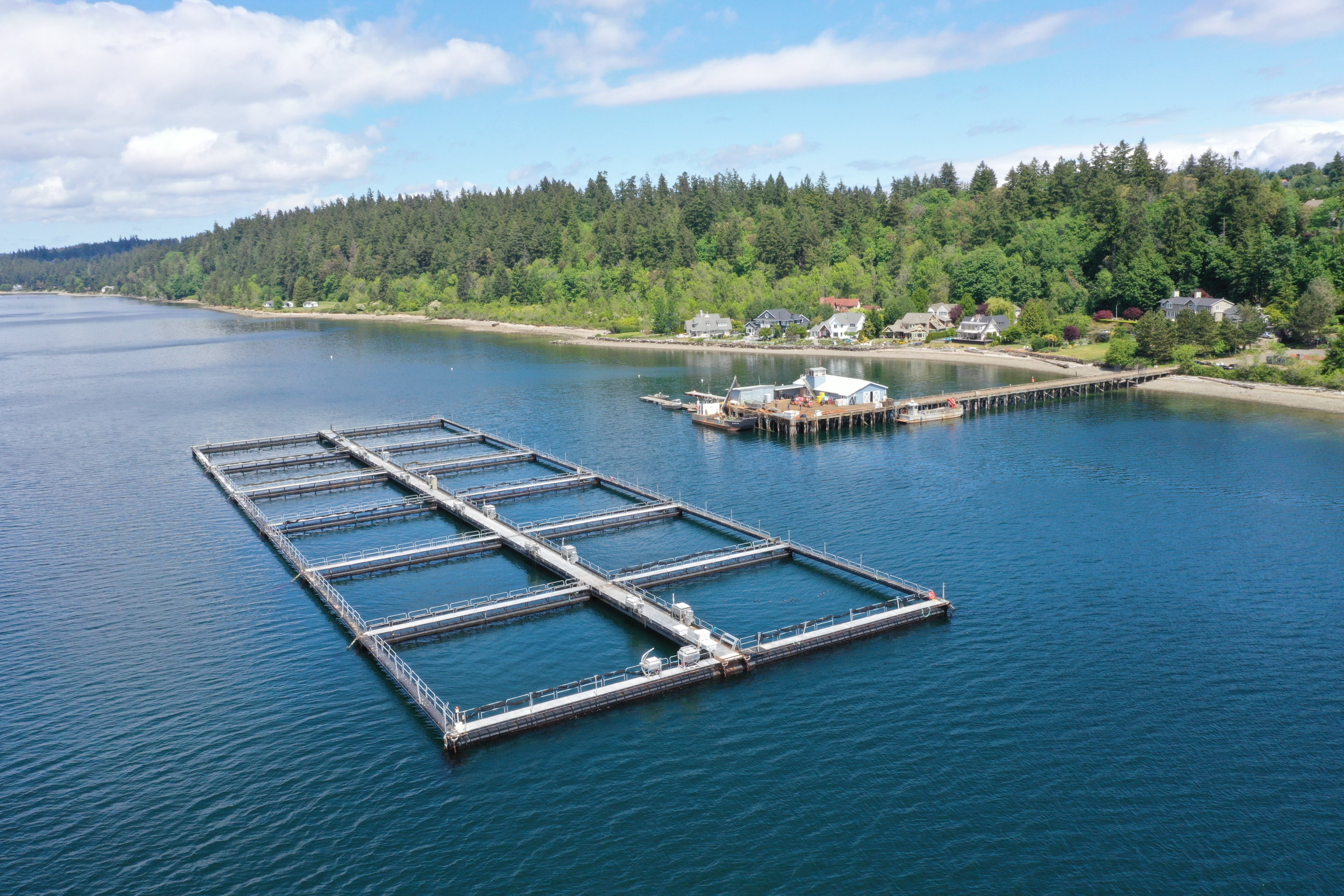State guidance for commercial marine net pen aquaculture
A commercial net pen in Rich Passage.
In early 2022, the Washington departments of Ecology, Agriculture, Fish and Wildlife, and Natural Resources released a guidance document for Commercial Marine Finfish Net Pen Aquaculture in Puget Sound and Strait of Juan de Fuca.
This guidance addresses ways the aquaculture industry and the state can reduce escaped fish from commercial net pens and avoid adverse impacts to water quality, fish and fish health, sensitive habitats, shellfish, and wildlife.
It also provides recommendations for the Legislature to consider, including:
- Increasing the capacity of agencies to provide industry oversight
- Conducting studies to set minimum engineering standards
- Funding for identified research needed to fill current data gaps
To develop the updated state guidance, agencies sought input from Tribal government partners, National Oceanic and Atmospheric Administration (NOAA), Northwest Indian College, Northwest Indian Fisheries Commission, University of Washington, Washington State University, Western Washington University, local governments, environmental organizations, and the public.
Background
For more than 40 years, commercial finfish farmers have operated marine net pens in Puget Sound and Strait of Juan de Fuca. Various state agencies regulate or lease public aquatic lands for these operations. However, state guidance for these operations had not been updated since 1990.
Recognizing the need to bring state guidance up to date, Washington agencies started a science-based update effort in 2015. The effort was paused, however, after a net pen array near Cypress Island collapsed in 2017, releasing about 250,000 non-native Atlantic salmon into Puget Sound.
This incident attracted significant public attention and concern about the industry and potential risks that operations raising non-native finfish might pose to native populations and the environment. As a result, the Legislature passed Engrossed House Bill 2957, which:
- Phases out Atlantic salmon net pens by 2022, and
- Prohibits new commercial aquaculture operations from raising non-native fish in state waters.
The new law also directed the state departments of Agriculture, Ecology, Fish and Wildlife, and Natural Resources to finalize new net pen guidance.
Developing guidance
To produce a new guidance document, state agencies worked with NOAA’s National Center for Coastal Ocean Science (NCCOS). For a variety of reasons, the collaborative effort to develop a document offering the latest science and updated management recommendations proved challenging. Instead, NCCOS agreed to complete a state of the science report while the four state agencies began developing a separate guidance document.
State of the Science Report
Produced by NOAA’s National Centers for Coastal Ocean Science (NCCOS), the State of Science on Net-Pen Aquaculture in Puget Sound report provides information about the safe and effective management of commercial marine net pen finfish aquaculture. The report is a significant collection of scientific studies analyzing the environmental impacts of fish net pen aquaculture. However, it should be noted that the document:
- Was not formally peer reviewed, although experts in marine aquaculture contributed to its development.
- Contains portions which may be inconsistent with the state’s understanding of the biological, physical, and cultural environment in Washington.
- Is just one source of information that state agencies used to inform the broader guidance document.
- Does not necessarily represent the management or policy views of the state.
State guidance
This guidance affects Puget Sound and the Strait of Juan de Fuca. These water bodies have existing net pens, and the appropriate depth and currents for net pen aquaculture.
How the guidance will be used
The state’s net pen guidance document applies to commercial net pen aquaculture operations in state marine waters and is designed to help:
- Local governments and state agencies identify and address risks from existing and future commercial marine net pens in Puget Sound and Strait of Juan de Fuca.
- Manage commercial net pens rearing native species such as steelhead trout.
- Deliver recommendations for future considerations by state managers and the Legislature.
The guidance does not address freshwater aquaculture, fisheries enhancement pens, or bait fish rearing pens.
Contact information
Casey Dennehy
Marine Policy Associate
casey.dennehy@ecy.wa.gov
360-688-0142
Curt Hart (for media inquiries)
Communications Manager
curt.hart@ecy.wa.gov
564-250-2126


